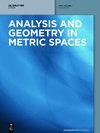测度空间上的BMO和John-Nirenberg不等式
IF 0.6
3区 数学
Q2 MATHEMATICS
引用次数: 2
摘要
摘要研究了广义测度空间𝕏上的BMO𝒢(𝕏),该空间具有固定集合𝒢的正测度和有限测度的可测集,由𝒢集合上的有界平均振荡函数组成。目的是了解当度量概念被度量理论概念所取代时,熟悉的BMO机制还能维持多少。特别地,考虑了BMO的三个方面:它作为Banach空间的性质,它与Muckenhoupt权的关系,以及John-Nirenberg不等式。给出了可分解测度空间𝕏中BMO𝒢(𝕏)是Banach空间模常数的充要条件。我们还发展了Denjoy族𝒢的概念,它保证了BMO𝒢(𝕏)中的函数在𝒢的元素上满足John-Nirenberg不等式。本文章由计算机程序翻译,如有差异,请以英文原文为准。
BMO and the John-Nirenberg Inequality on Measure Spaces
Abstract We study the space BMO𝒢 (𝕏) in the general setting of a measure space 𝕏 with a fixed collection 𝒢 of measurable sets of positive and finite measure, consisting of functions of bounded mean oscillation on sets in 𝒢. The aim is to see how much of the familiar BMO machinery holds when metric notions have been replaced by measure-theoretic ones. In particular, three aspects of BMO are considered: its properties as a Banach space, its relation with Muckenhoupt weights, and the John-Nirenberg inequality. We give necessary and sufficient conditions on a decomposable measure space 𝕏 for BMO𝒢 (𝕏) to be a Banach space modulo constants. We also develop the notion of a Denjoy family 𝒢, which guarantees that functions in BMO𝒢 (𝕏) satisfy the John-Nirenberg inequality on the elements of 𝒢.
求助全文
通过发布文献求助,成功后即可免费获取论文全文。
去求助
来源期刊

Analysis and Geometry in Metric Spaces
Mathematics-Geometry and Topology
CiteScore
1.80
自引率
0.00%
发文量
8
审稿时长
16 weeks
期刊介绍:
Analysis and Geometry in Metric Spaces is an open access electronic journal that publishes cutting-edge research on analytical and geometrical problems in metric spaces and applications. We strive to present a forum where all aspects of these problems can be discussed.
AGMS is devoted to the publication of results on these and related topics:
Geometric inequalities in metric spaces,
Geometric measure theory and variational problems in metric spaces,
Analytic and geometric problems in metric measure spaces, probability spaces, and manifolds with density,
Analytic and geometric problems in sub-riemannian manifolds, Carnot groups, and pseudo-hermitian manifolds.
Geometric control theory,
Curvature in metric and length spaces,
Geometric group theory,
Harmonic Analysis. Potential theory,
Mass transportation problems,
Quasiconformal and quasiregular mappings. Quasiconformal geometry,
PDEs associated to analytic and geometric problems in metric spaces.
 求助内容:
求助内容: 应助结果提醒方式:
应助结果提醒方式:


